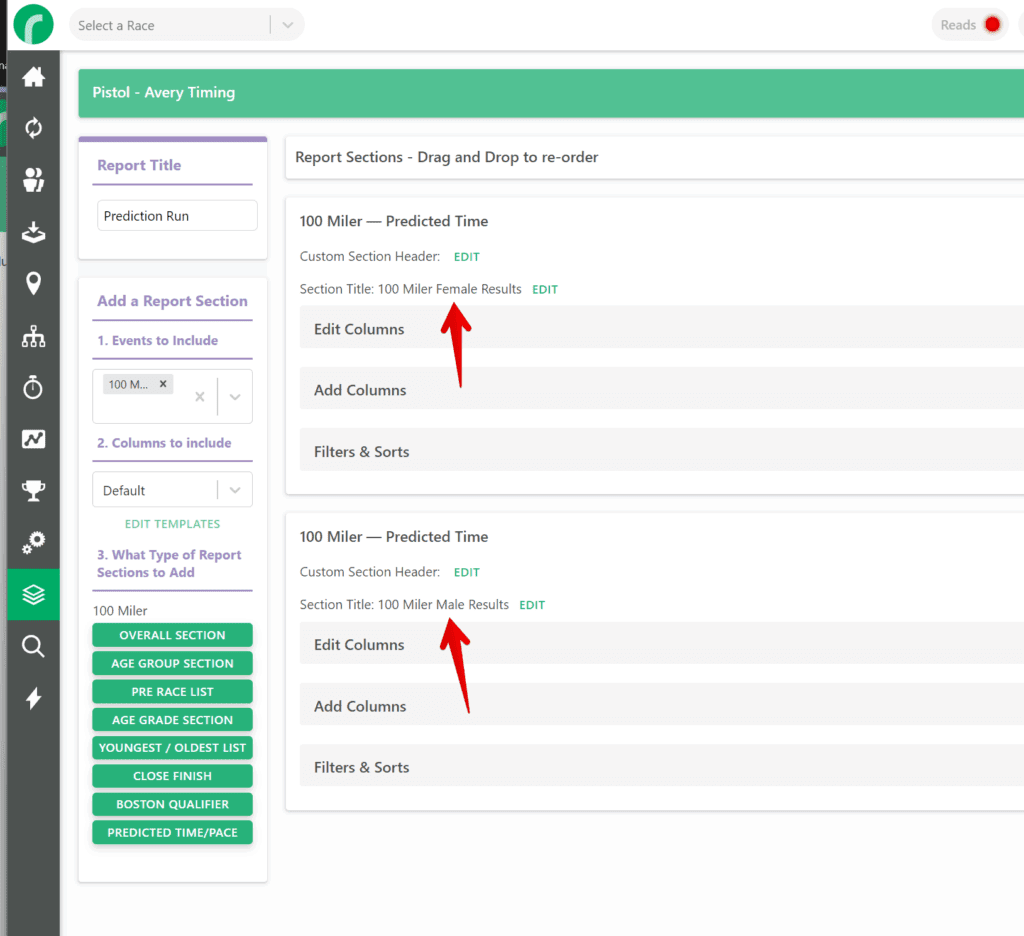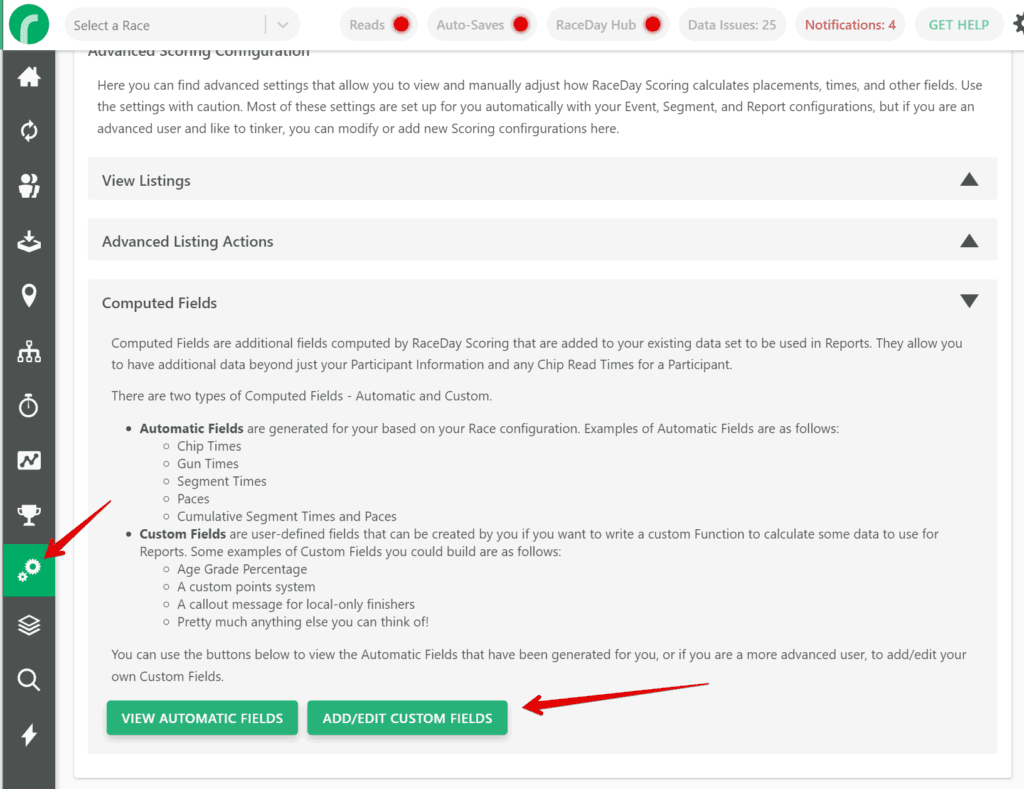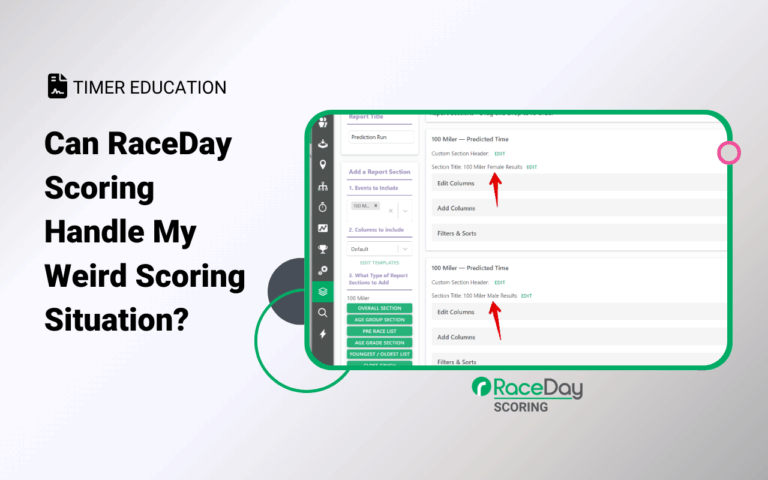One of the most common questions we hear from timers is: “Can RaceDay Scoring handle my unique scoring situation?”The answer is almost always yes – and often in more than one way. RunSignup’s RaceDay Scoring is both powerful and flexible, giving timers the ability to accommodate all kinds of race formats, rules, and challenges that don’t fit neatly into traditional models.
Every race has its quirks. Whether it’s handling multi-part events, scoring unusual formats, or applying performance-based penalties and bonuses, timers need tools that don’t box them in. RaceDay Scoring makes that possible with customizable features, nuanced options, and the ability to build creative solutions that work for your specific event.
Below are four real examples of how RaceDay Scoring adapts to some of the most challenging scenarios timers face.
Challenge / Bundle Scoring
Challenge: Organizing a race with multiple but connected segments—like a 5K and 10K combo—where participants need both individual results and an overall “challenge” score.
Solution:
RaceDay Scoring supports Challenge/Bundle setups by linking events together using RunSignup’s Super/Sub Eventregistration. Timers can then create separate Scored Events for each segment and the combined bundle, ensuring participants appear in all appropriate results automatically.
To prevent overlap, timers can assign unique Timing Locations or filtered streams to each portion. A Rest Segment can even be inserted between events to subtract downtime from the combined time. For those preferring gun/clock time, RaceDay Scoring can accommodate that too—though timers should account for potential clock vs. chip timing differences.
This flexibility ensures that both individual race results and overall challenge standings are managed seamlessly.
Dynamic Adjustments
Challenge: Some races need to modify finish times based on real-time performance factors—like penalties for missed obstacles, or bonuses for fun side challenges.
Solution:
RaceDay Scoring’s Dynamic Adjustments feature allows timers to apply automated time modifications as race data is collected. Adjustments can be penalties or bonuses, and they directly alter participants’ official times.
Timers configure Custom Questions (e.g., number of obstacles missed, donuts eaten, penalty tiers), then map those responses to fixed or variable time values. Adjustments flow instantly from tools like the RaceDay CheckIn App, meaning results update in real time without manual entry.
Examples include:
- +2 minutes per missed obstacle
- –30 seconds per donut eaten
- Tiered penalties based on multiple-choice options
This approach eliminates spreadsheets, saves time, and reduces errors—all while supporting complex formats like obstacle races and team scoring.
Prediction Run Scoring

Challenge: Prediction runs reward participants not for speed, but for how closely they finish to their predicted time or pace—a scoring method that used to require manual or custom workarounds.
Solution:
RaceDay Scoring now offers Prediction Run Scoring as a built-in feature. Timers simply toggle it on in the Scored Event setup, specify whether the prediction is based on time or pace, and link it to a Custom Question or Field formatted as a time value.
Reports then rank participants by the accuracy of their prediction, with optional splits by gender.
Instead of complicated computed fields, this native option streamlines the process—making prediction races easy to score, report, and celebrate.
Custom Computed Fields

Challenge: Some events demand highly specific scoring logic—like blending endurance and strength challenges, calculating unusual totals, or creating special data points for reports.
Solution:
RaceDay Scoring’s Custom Computed Fields empower timers to design their own scoring logic. These fields can:
- Combine segment times
- Apply math formulas (e.g., deductions, multipliers)
- Run conditionals (IF/ELSE logic)
- Identify fastest or slowest splits using aggregate functions
Timers can build both millisecond and human-readable versions for accuracy and clarity. Once created, computed fields become available in reports, sorting, and exports.
A great real-world example: At the Arnold Pump and Run 5K, participants’ chip times were reduced by 30 seconds for every bench press rep completed. Using computed fields, timers applied this logic automatically, eliminating manual calculation and enabling immediate publishing of results.
Ready to Tackle Your Unique Event?
From multi-race bundles to quirky prediction runs, from penalties and bonuses to fully custom scoring logic, RaceDay Scoring is built to handle the unusual, the creative, and the downright “weird.”
If you’d like help with a specific challenging or unique event, schedule one-on-one time with us and we’ll work with you to find the right solution.

